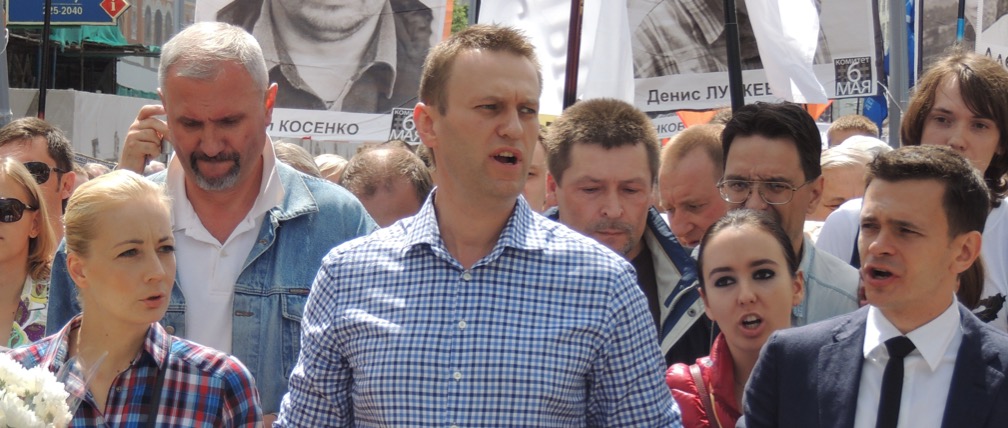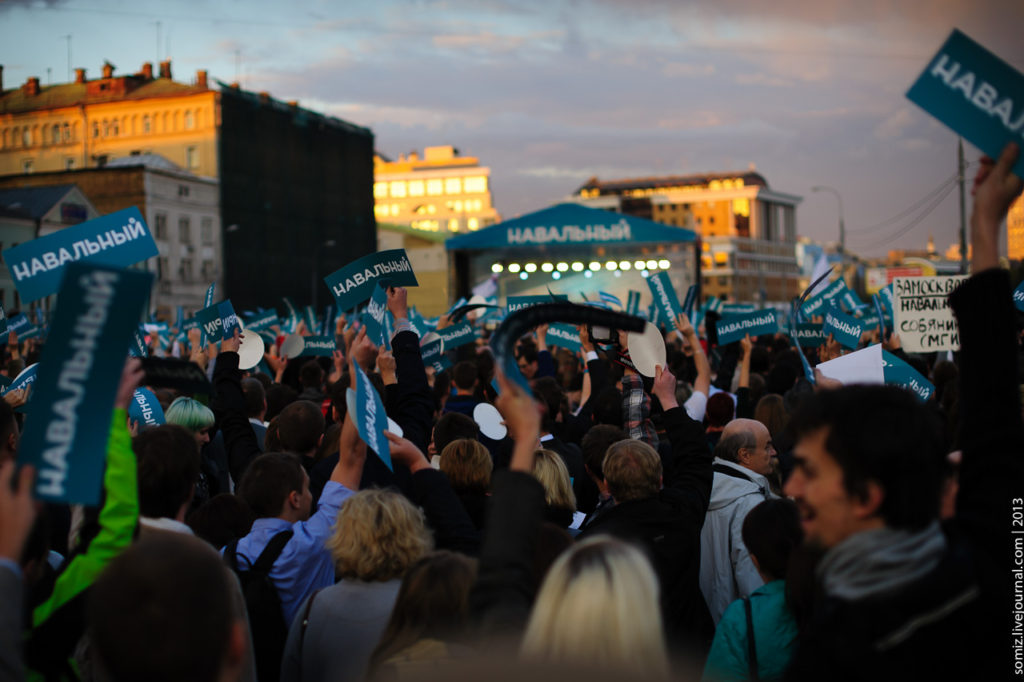Barring the Opposition: What Does Putin Have to Fear?
 https://commons.wikimedia.org/wiki/File%3AYulia_Navalny%2C_Alexey_Navalny%2C_Anna_Veduta_and_Ilya_Yashin_at_Moscow_rally_2013-06-12_1.JPG
https://commons.wikimedia.org/wiki/File%3AYulia_Navalny%2C_Alexey_Navalny%2C_Anna_Veduta_and_Ilya_Yashin_at_Moscow_rally_2013-06-12_1.JPG
Tensions among key candidates are quickly rising in Russia as the March presidential election date draws closer. On Christmas Day, the Central Election Commission officially barred opposition leader Alexei A. Navalny from running in the 2018 election, in a decision that sparked questions of legitimacy from the European Union. The following day, Navalny fired back by calling for a national boycott of the election and threatening massive street protests. In response, the Kremlin has issued a warning of the possible legal repercussions of inciting an election boycott.
Navalny, an anti-establishment corruption-fighter, finds himself in hot water. Establishing an Anti-Corruption Foundation in 2011, and running for Moscow mayor in 2013 under his decentralizing Progress Party, Navalny has been an outspoken opponent of Putin’s regime for many years. Fashioned as a modern-day Theodore Roosevelt, Navalny continues to run on these “trust-busting” policies since announcing his candidacy for president in late 2016. An infamous political activist, he has gained a significant following – especially among young voters – through his charismatic speeches and decentralized online campaign, such that he is hailed as the only opposition leader with a chance.
The Chips Are Stacked
Unsurprisingly, Navalny’s campaign has not been short of hindrances. Convicted of embezzlement and fraud in a 2013 trial of questionable legitimacy, he was given a five-year suspended sentence until granted an appeal from a higher court. This verdict was dismissed by the European Court of Human Rights and subsequently the Russian Supreme Court, ruling Navalny had not been given a fair trial. Seemingly ignoring the reason for the dismissal, the original district court convicted him again at a hasty retrial in February of this year, which conveniently occurred during his campaign for a presidential nomination. 12 out of the 13 members of the Central Election Commission then voted to bar Navalny from candidacy on December 25, 2017, citing his suspended prison sentence as the reason for exclusion. An unfair trial, a faulty prison sentence, and perfect timing during his campaign seem to indicate quite an unjustified – but Kremlin-approved – ban on Navalny.
Even before the official ban, his name was forbidden from state-controlled television, except in connection with his trial and the charges of embezzlement. The current prime minister Dmitri Medvedev dismissed him without mention of his name, simply calling him a “rogue” trusted by nobody. State-associated polling organizations did not include his name in the running. Even independent opinion polls such as Levada measure Navalny’s rating at a mere 2 percent, most likely due to purposeful inaccuracies or because even those who plan to vote against Putin fear backlash from the state should they admit it in public.
The Russian election is recognized to be more ceremonial than operative. Candidates have to be approved by the Kremlin. They can only appear on television with Kremlin approval. In other words, all candidates that receive a presidential nomination from the Kremlin are very strictly vetted, in what New York Times writer Andrew Higgins called a “managed democracy.” There are opinion polls of ambiguous validity and a vote with a pre-ordained outcome. Vladimir Putin, has been in power for 18 years and is running for a fourth 6-year term, is seemingly a sure bet, with a reported 80-percent approval rating and having all the power of the Kremlin behind him.

Fearing the Underdog
Putin is sure to win Russia in 2018, with or without opposition. So why does the C.E.C. – closely tied with Putin’s administration – feel the need to bar strong opposition candidates like Navalny from the ballot? What does the Kremlin have to fear?
Navalny, as a candidate, has certainly broken many Kremlin stereotypes. While most selected candidates are the cookie-cutter establishment type that pose little threat to Putin’s rule, he has been starkly anti-regime from the outset. While mainstream party candidates – such as Vladimir Zhirinovsky, long-time leader of Russia’s Liberal Democratic Party and presidential candidate in four previous elections – may propose changes, they are traditionalists and make a point never to openly criticize Putin and his regime. Navalny, on the other hand, openly accused Putin’s United Russia of being the “party of crooks and thieves.” He made a YouTube video in March detailing the corruption of Prime Minister Medvedev. He blasts Putin about his “foreign policy adventurism” that is harming the Russian economy. Promising to overhaul the oligarchy and redistribute the wealth, Navalny spares nothing in his denouncement of the ancien régime.
Carrying these promises is Navalny’s ability to mobilize the masses. An emerging leader in the Moscow 2011-12 election protests, Navalny has developed quite a devoted following, particularly among young, well-educated Russians: a mobilizing demographic. Connecting with voters through a decentralized and personal campaign strategy, he has crisscrossed the country with his angry message against the corruption and power concentration in the Kremlin, inspiring huge rallies and mass protests. Navalny stands to entirely destabilize decades of Russian politics.
Navalny’s threat of a boycott could also negatively impact voter turnout. With Putin as a sure bet to win, many voters may choose to stay home ordinarily – a fact that has long worried the Kremlin. With Navalny’s boycott, the turnout could be next to nothing.
Aside from total turnout, any reduction in Putin’s margin of victory is seen as humiliating. Putin’s drive to be not only a winner but a big winner immediately conflicts with Navalny’s talent for mobilizing the masses, proven by the mass protests in his name taking place all over the country. Opinion polls are not always accurate: under Putin’s regime, many Russian citizens may not admit their plans to vote against him – especially not for oppositionist Navalny – for fear of government repercussions. Knowing this, even the “independent” polls such as Levada are probably not giving Navalny the numbers he deserves. An underdog election like Trump’s is definitely unlikely, but the Kremlin obviously does not want to take chances.
Edited by Frankie Wallace
